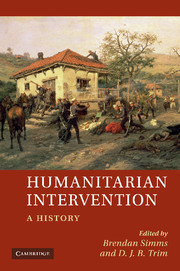Book contents
- Frontmatter
- Contents
- List of maps
- Notes on contributors
- Acknowledgements
- List of abbreviations
- 1 Towards a history of humanitarian intervention
- Part I Early modern precedents
- Part II The Great Powers and the Ottoman Empire
- 5 ‘From an umpire to a competitor’: Castlereagh, Canning and the issue of international intervention in the wake of the Napoleonic Wars
- 6 Intervening in the Jewish question, 1840–1878
- 7 The ‘principles of humanity’ and the European powers' intervention in Ottoman Lebanon and Syria in 1860–1861
- 8 The guarantees of humanity: the Concert of Europe and the origins of the Russo–Ottoman War of 1877
- 9 The European powers' intervention in Macedonia, 1903–1908: an instance of humanitarian intervention?
- Part III Intervening in Africa
- Part IV Non-European states
- Part V Postscript
- Index
7 - The ‘principles of humanity’ and the European powers' intervention in Ottoman Lebanon and Syria in 1860–1861
Published online by Cambridge University Press: 18 April 2011
- Frontmatter
- Contents
- List of maps
- Notes on contributors
- Acknowledgements
- List of abbreviations
- 1 Towards a history of humanitarian intervention
- Part I Early modern precedents
- Part II The Great Powers and the Ottoman Empire
- 5 ‘From an umpire to a competitor’: Castlereagh, Canning and the issue of international intervention in the wake of the Napoleonic Wars
- 6 Intervening in the Jewish question, 1840–1878
- 7 The ‘principles of humanity’ and the European powers' intervention in Ottoman Lebanon and Syria in 1860–1861
- 8 The guarantees of humanity: the Concert of Europe and the origins of the Russo–Ottoman War of 1877
- 9 The European powers' intervention in Macedonia, 1903–1908: an instance of humanitarian intervention?
- Part III Intervening in Africa
- Part IV Non-European states
- Part V Postscript
- Index
Summary
The time is fast approaching when the imperative claims of Christianity and humanity must and ought to absorb all others in the much vexed Eastern Question.
Charles Churchill, The Druzes and the Maronites (1862)Previous chapters have identified several areas where the concept, rhetoric and practice of humanitarian intervention developed from the sixteenth century onwards. Nineteenth-century instances of humanitarian intervention certainly built on earlier precedents, especially as far as the discourse justifying and demanding protection, the groups of people deserving protection, and concepts such as ‘rights of mankind’ and ‘rights of humanity’ are concerned. In this chapter and then in Chapter 9, I deal more specifically with two instances of intervention, both related to the Ottoman Empire. The first (and the subject of this chapter) took place in Lebanon and Syria in 1860–1, and the second occurred in the European territories of the Ottoman Empire, known as Macedonian provinces, from 1903 to 1908. My objective is to illustrate when interventions took place, for what reason, who undertook them and on behalf of whom they were undertaken.
My starting assumptions are as follows: the structure of the nineteenth-century international system hindered unilateral intervention (whether for humanitarian or other purposes) by a European power within the boundaries of another European state, unless the latter wished to risk a war with the target state or a general war.
- Type
- Chapter
- Information
- Humanitarian InterventionA History, pp. 159 - 183Publisher: Cambridge University PressPrint publication year: 2011
- 1
- Cited by



